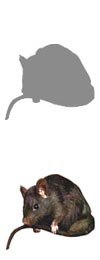 House Mice Control and Treatment House Mice Control and Treatment
House mice control is not about the cute and cuddly storybook image of the mouse stands in stark contrast to the damage they can cause and the diseases they can spread in real life. Mice will chew through wood and even electrical insulation to get at foodstuffs, causing not only hygiene but other safety problems as well.
Holes chewed in food boxes and bags, along with nearby trails of droppings, are evidence of the presence of mice. Sealing the gaps and cracks that they use for access, and keeping food and refuse in tightly sealed containers will help prevent infestations.
Our internationally recognized K-9 detection team will inspect your home or business for mice and other pests. If you’re looking for house mice control, call 1-905-761-9388 to schedule an appointment or submit an Inspection Request Form today!
- How do I recognize a mouse?
- Are mice hazardous to humans?
- When are mice most common?
- Where do mice build nests?
- How can I tell if I have an infestation of mice?
- What are their breeding habits? Do mice multiply quickly?
- Do mice die off in cold months?
- If I have an infestation of mice, what can I do to eliminate them?
How do I recognize a mouse?
Mice are common in all parts of Canada. They are usually dusky grey in colour and measure from 10 to 15 cm (4″ to 6″) overall, with large ears and long tails.
Are mice hazardous to humans?
Yes. Mice contaminate food with their droppings and urine. They spread such diseases as salmonella bacteria (food poisoning), leptospirosis, and typhus.
They also carry parasites such as fleas, roundworms, and mites. A bite inflicted by a mouse should receive prompt medical attention.
When are mice most common?
Mice are year-round pests, however activity and indoor migration increases as the weather gets cooler. Mice become active primarily during the evenings and remain so until the middle of the night. However, if food is scarce or the infestation is large, they will be active during daylight hours.
Where do mice build nests?
Mice nest in any safe location close to food, preferring the spaces in double walls, between ceilings and floors, and closed-in areas such as drawers and around counters. Noises made by their running, gnawing, and scratching will provide clues to their actual location.
How can I tell if I have an infestation of mice?
There are several ways that mice make their presence known. Mouse droppings near available food are the most common indication. Gnawed holes in bags and boxes containing food or garbage are also common signs.
What are their breeding habits? Do mice multiply quickly?
The average life span of a mouse is 18 months. The young are born about 19 days after breeding and mature rapidly. A single female may have as many as 8 litters per year, averaging 5 to 6 young each. By 3 months, the young are independent and capable of reproduction.
Do mice die off in cold months?
No. Mice can survive outdoors during the winter under certain conditions, but generally invade buildings when the weather turns cold.
If I have an infestation of mice, what can I do to eliminate them?
Depending on the severity of the infestation, a single control measure may not be effective and an integrated program conducted by a Purity Pest Control professional may be required. |